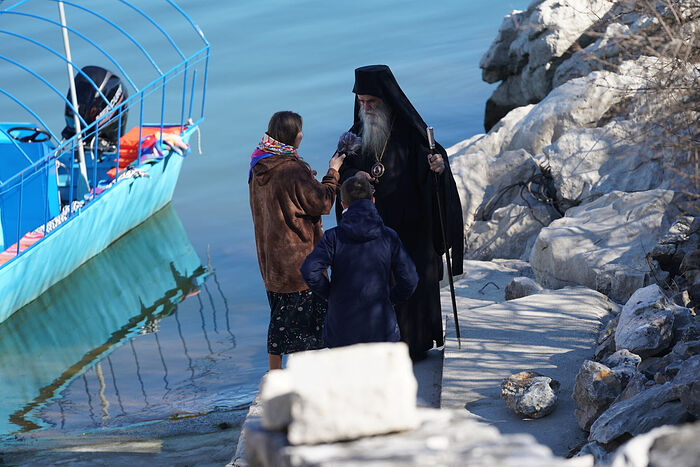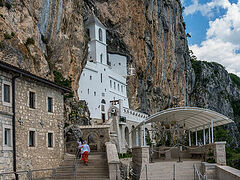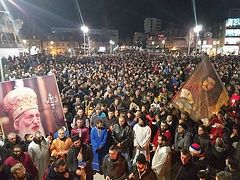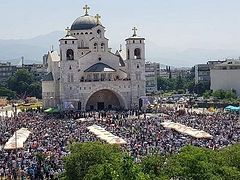There are films that bring the whole audience together, and there are those that leave everyone alone with themselves. The latter happened during the premiere of Yulia Bocharova's film, Swallows of Christ. The parishioners of various churches of Pokrovsk1 gathered in the auditorium, but I had the feeling that I was watching it absolutely alone—the story was so intimate.
Trailer (in Russian) for the film, Swallows of Christ
On a simple and obvious miracle
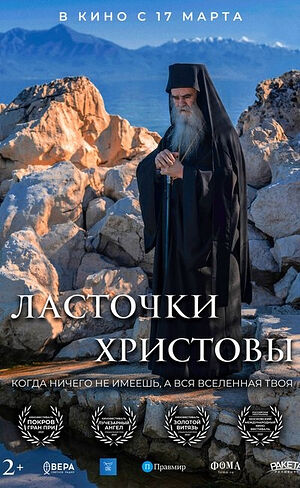 Christ's swallows are monastics. Those who renounced the world and in return acquired Heaven and the entire Universe. Metropolitan Amfilohije of Montenegro and the Littoral spoke thus about them—lovingly and affectionately. He is a real hero—of the film and the story that formed the basis of its plot. He is also the mother, the father, and the wise grandfather for his clergy, monks and ordinary parishioners.
Christ's swallows are monastics. Those who renounced the world and in return acquired Heaven and the entire Universe. Metropolitan Amfilohije of Montenegro and the Littoral spoke thus about them—lovingly and affectionately. He is a real hero—of the film and the story that formed the basis of its plot. He is also the mother, the father, and the wise grandfather for his clergy, monks and ordinary parishioners.
A film about a miracle—a surprisingly simple and obvious one. The story is quite recent, and at first glance it is about church property. On the night of December 26-27, 2019, the Montenegrin Parliament (the Skupština) adopted the draft law “On Freedom of Religion and Belief and the Legal Status of Religious Communities”. It provided for the confiscation from the Serbian Church in Montenegro and the transfer to the ownership of the State of objects and lands used by religious communities, if they had belonged to the State before December 1, 1918 or if there were no documents on their registration as church property (most often ancient churches and monasteries have no such registration). These are more than 650 churches and monasteries, including the famous Ostrog Monastery, where St. Basil of Ostrog struggled.
But in fact we are not talking about buildings, but about faith, traditions, and the holy shrines that are so dear to the Serbian heart, about the monasteries restored by the hard work of ordinary monks. And about priorities in life, the hierarchy of values that you clearly feel in such dramatic moments. Many residents of Montenegro understood it and began to protest. But not in the language of rallies, demonstrations and riots, but prayer, cross processions and sermons. The faithful of Montenegro were supported by Orthodox Serbia. The Holy Synod of the Russian Orthodox Church delivered a special message as well.
“We were in the very center of real historical events that influenced the future life of an entire nation. I remember standing on the bell tower of the cathedral in Podgorica and seeing with my own eyes how the city was being filled with believers who were praying for their Church, their families and traditions. This is a true confession of faith in our days, a living Christianity. Metropolitan Amfilohije delivered his most ardent sermons and was able to gather hundreds of thousands of believers for prayer,” Yulia Bocharova recalls.
Finishing the film, she admitted that the ending was intended to be different. But on October 30, 2020, Vladyka Amfilohije departed to God. And on the fortieth day after his repose, the Government of Montenegro approved amendments to the law on religious communities, and the dispute was resolved in favor of the ancient churches and monasteries, in favor of the faith and faithfulness of ordinary parishioners—and of all the swallows of Christ who make their nests in the high mountains of Montenegro.
Both a pilgrimage and a flight
The film seems to be about a conflict, but you hardly remember it when you leave the auditorium. It leaves such a peaceful, deep impression. It is primarily about them—swallows aspiring to Heaven. About those people who “see the very essence in every person. And if someone has a broken heart, they will share a piece of theirs.” About strange people who, with their quiet, modest struggle save the world, heal human souls and silently preach the simple truth: that without Christ the world has become strange, sick and broken. And to live, forgetting yourself, is not strange. This is the norm for man, who was created by God.
Admiring Montenegro’s stunning nature, you freeze before the greatness of the Creator’s plan. “Life is the mystery of God’s love for man,” the voice of the film’s author echoes my thoughts. She shares her experiences and reflections very subtly, delicately and unobtrusively. So the whole film creates a feeling of a sincere conversation, leaving space for the viewer's experiences.
And the whole film is both a flight over beautiful Montenegro and a pilgrimage to its churches and monasteries. There are many significant events and Serbian names in the story, along with a lot of amazing love of the Serbs for the Russian people. “I think we are one people,” says one of the interviewees. And when you hear stories about saints who were Serbs by birth, but brought up in Russia, about how Vladyka venerated Russian saints, you believe it with all your heart.
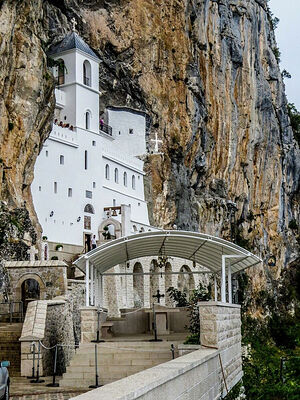 “He who has not been to Ostrog has not prayed, and he who has not been on Rumija Mountain has not repented,” a local saying goes. Rumija is a mountain over 1,500 meters (c. 0.93 mile) high. It is crowned by a small church in honor of the Holy Trinity. Legend has it that this church, destroyed many centuries ago by Turks, would be restored and even let down “from the sky”. And so it happened—in 2005 it was let down by helicopter.
“He who has not been to Ostrog has not prayed, and he who has not been on Rumija Mountain has not repented,” a local saying goes. Rumija is a mountain over 1,500 meters (c. 0.93 mile) high. It is crowned by a small church in honor of the Holy Trinity. Legend has it that this church, destroyed many centuries ago by Turks, would be restored and even let down “from the sky”. And so it happened—in 2005 it was let down by helicopter.
This church on the top of the mountain is associated with the name of the Martyr Jovan Vladimir and his cross. Today the saint’s cross is kept by the Androvic family. On the feast of the Holy Trinity they take it out to the faithful and walk in a procession at night to the top of Rumija to celebrate the Liturgy at sunrise there with special joy.
Below, at an altitude of 1000 meters (c. 0.62 mile), there is a convent dedicated to St. Sergius of Radonezh. The idea of dedicating a convent to this illustrious Russian saint was proposed by Metropolitan Amfilohije. Initially, it was planned just to build a house here for a person who looks after the Church of the Holy Trinity. But who could do it better than St. Sergius?
The climate is harsh here—tornados sometimes demolish buildings. Life is austere—water and electricity are strictly limited. Montenegrins were surprised that a convent would be opened there, but then they calmed down because some Russian nuns were going to Rumija.
How do they, yesterday’s Muscovites, survive in such harsh conditions? “Life is such that everywhere you have to endure something. Thus the human heart is cleansed,” one of the members of the convent answered our question simply. “The Serbs say: ‘We should learn repentance from the Russians, and they should learn joy from us.’” What can be added here? This friendship between our fraternal peoples probably exists for this important lesson.
Pain and love
It is impossible to talk about the Serbs without mentioning Kosovo. Archival footage of hostilities strikes a deep chord in our heart—how defenseless we are on earth! But this is if we live only on earth and rely on earthly things. “Love fills us with meaning, in the light of which we can understand suffering,” it was this love that helped Vladyka Amfilohije survive different things. “We saw much, we buried many,”—he doesn’t want to talk about grief at length. It must be endured with prayer.
Metropolitan Amfilohije, a disciple and novice of Elder Paisios the Hagiorite, recalls with a smile how a snake crawled up to the saint, and he fed it: “ ‘I would have killed it.’ And the elder said: ‘You wild Montenegrin, you would kill and kill.’” An important lesson from a holy elder: There are no winners in the war of evil against evil, but goodness and love always win.
“The metropolitan loves people, and people love him”—what a simple phrase! But it contains both Vladyka’s legacy and the purpose of life for each of us. “Real life is not in external success—it is inside us. This is a victory in the spirit,” the author of the film reflects. Swallows win in flight. And we at least follow them with an admiring glance. And the film by Yulia Bocharova will help every viewer in this.

